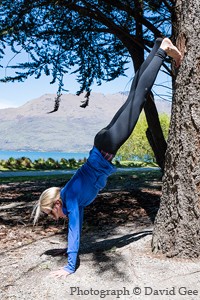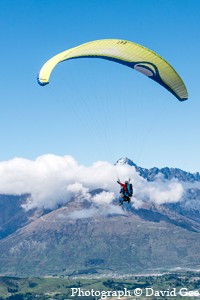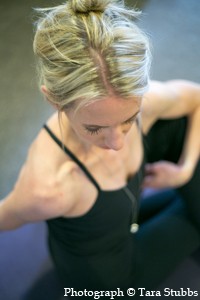Reinventing Emma (24 page)
Authors: Emma Gee

Auntie Em with her brood of nieces and nephews, a major source of daily motivation, 2014. (L-R) Lucy, Harry, Em, Tom, Olive, Ellen, Holly & Jack.

At the park I veer off the even path, taking a shortcut across the bumpy grass to the tanbark area. I unleash Gilbert, leave my frame near the monkey bars and join my niece on the black web-like rope course.
“Do you think I can climb to the top?” I ask her.
“You'll do it easily, Auntie Em!”
I smile and try to make clambering up look easy, determined to make her see that anything's possible if you just give it a go. Maybe things are done differently, but they still can be accomplished.
After lunch, with tanbark-covered legs and blistered hands, I return to my home office to do another stint of work before my yoga class. My ears still ring with my niece's pleas to, “Watch this, Auntie Em!”

The prospect of a child-free future terrifies me. The physical toll pregnancy would place on my body, along with feeling that it'd be unfair to inflict my disability on my child, haunts me. But even if I never have children, I know I will have fewer regrets having shared these little ones.
I smile inwardly. I do love my life. Many wonder how I could, assuming that my quality of life would have been crushed when I acquired my disability. In fact, my new self only makes me appreciate life more. Every day I try to turn obstacles into opportunities.
You can't have a rainbow without rain
, I repeatedly chant to myself.
At times sustaining this mindset isn't easy. As an inspirational speaker it is assumed my motivation is never-ending. But I am human and need to stop sometimes to recharge. I now know that stopping forces you to reflect, something that is vital but so hard to do. I still see my psychologist occasionally. I also schedule in other breaks to reflect and refuel, whether it's returning to my parents' place, visiting my sister's family or relatives in New South Wales, or travelling alone. Without such circuit breakers I can't sustain what I do and maintain a balanced quality of life.
When travelling with friends, I need to organise trips with smaller groups of people. As time has gone on they have become so mindful of my extra needs. Hiring cars, carrying my luggage, making my bed, booking accessible accommodation or cooking my meals are just some of the things my friends now do that make holidays so much easier. Accepting their help is better than becoming frustrated or interpreting their kind offers as devaluing. I'm probably now a better travel partner.
As time goes on, the prospect of travelling and holidaying overseas with others has become less daunting. So many adventures, opportunities and possibilities are ahead of me.

Em chooses to turn her world upside down in her favourite yoga pose in New Zealand, 2015.

Em paraglides over Queenstown, New Zealand 2015.
Yoga is another opportunity to reflect on, which I have incorporated into my everyday life. Through yoga I can absorb all that I've done and at the same time calm my mind, like stilling a shaken-up glass snow dome and letting the white snowflakes settle. Afterwards I feel grounded, anchored and balanced.

My aqua yoga mat is rolled out for me in my usual spot and a fellow yogi places a purple block beside it. Walking unaided to reach this spot is always a challenge, dodging the other coloured mats and zig-zagging around tranquil flattened bodies. Sitting in a cross-legged position I heave a sigh of relief at not having fallen on anyone. I lie back to join the other yogis in their relaxed states. The placement of my mat in a little nook gives me a sense of security, comfort. Throughout my practice I can adapt all the instructed postures by latching onto the wall next to me, giving me that extra support.

Em incorporates yoga in her life to ensure she feels grounded, anchored and balanced, 2014.
The
shoulds
of challenging myself by attempting certain poses have been at the forefront of my mind. Although I've accepted my disability, I fear that I have become resigned to reaching my limit and that
this is it
. I need to keep pushing my limits. So today when the yoga instructor demonstrates a new pose and warns us that it will challenge our balance, I force myself to have a go. I take a deep breath, squeeze my eyes shut and in the middle of Warrior 3 I let go of the supporting wall. Next minute I'm on my back, tangled up in embarrassment, my glasses crooked, and me staring at the ceiling. The other yogis are standing in split stance, their weight evenly distributed. Balanced, so still and focused, as I try to work out how to untangle myself.
“Are you OK?” my yoga instructor whispers, concerned.
“I'm fine. I could do this last week so I thought I'd try again,” I whisper. But my words don't come out as quietly as I had hoped and a few yogis turn. I crookedly grin. Once I would've wished my bruised ego and I could disappear into the mat. But today I'm glad I tried. I admit to being frustrated that it didn't eventuate like I'd planned. But I know that I'll get there with time and practice. The others around me keep going. When I'm ready, I take another deep breath and join them.

Chapter 39
Finding Where I Fit
At the tram stop an elderly lady lowers herself ever so slowly onto the green, splintered bench beside me. Her spine is so curved she doesn't even need to lean forward as she rummages through the handkerchiefs, jars of lollies and papers stowed in the wire basket under the black vinyl seat of her walking frame. She mutters loudly to herself and then turns stiffly towards me, eyeing my walking frame. “Do you find that your joints get achy, Dear?” she asks. “It's worse in this cold wind though, isn't it, Lovey.” I just listen. Many people assume that I share their issues now that I roam around in a disabled shell and use a walking aid. And it's probably true.

I have become used to being sometimes ignored by my generation and pitied by those older than me, or automatically spoken to as if I'm their best chum. Today, any reference to the many similarities I share with another is a relief. Without speaking, there's already a mutual respect and acknowledgement of what we endure.
When I first started meeting younger stroke survivors, associating with their issues (the same ones I had faced early on) was confronting. All I could see was a mirror of deficits, our similarities rudely staring back at me. I would chat away brightly, highlighting the many positives we both needed to hear, but would leave feeling gutted and disheartened at our likenesses.
Now I have formed some great friendships with young survivors. I love the opportunity to give back, and to make them feel less alone. That mentor figure is something that I lacked in my own recovery. The whole process of helping them has become therapeutic for me as well. The commonality with fellow survivors is priceless. I don't need to explain what fatigue is, what nerve pain feels like and the effort involved in doing any task or achieving a milestone is automatically acknowledged. The yo-yo nature of recovery is understood â those days where you wake feeling disability-free followed by days of feeling like you're 90+ and just want to cry.
Many survivors have been left physically unscathed but struggle with other impacts of stroke, like memory loss or personality changes. I used to be jealous of people like them and their ability to return to their old life easily. I've since learnt that their scars may be invisible but impact them just as badly. Because many appear to be physically able, they are not eligible for rehab and community services. Although I might moan about rehab, it does make the transition from one life to another much smoother.
Having a physical disability is also easier for those around me to understand. It's visual proof that I'm not normal and at times a valid excuse if I'm tired or unable to join in. In fact, fellow survivors without physical deficits have resorted to carrying walking sticks to flag to strangers that they need to be mindful. Long term, the many invisible effects of stroke such as fatigue, chronic pain and frustration are definitely shared by many survivors.
Initially I was too unwell to exert energy into being angry. I was so reliant on those around me to fight on my behalf. Their forgiving, optimistic and forward-thinking attitudes certainly affected my outlook as I began to take control of my life again. In saying that, there have definitely been times throughout my recovery, and still are, where I feel bitter and frustrated. Nowadays this only seems to fuel my motivation to advocate for others. For me, I've learnt that focusing on and being angry about what I've lost is a waste of time and energy, although it's important to acknowledge my feelings of anger. I have found ways to vent. Whether it's through a yoga session, writing, or a chat with friends, I can still move forward despite the presence of these feelings. I had a stroke â no compensation or angst will change that.
Many ask if I get upset and irritated with some people's unhelpful actions and attitudes. Initially I was very frustrated and alone when I wasn't offered assistance with stairs or was not given a seat on public transport. It reinforced why many give up trying to feel accepted and included in society. But a few years into my recovery I met a paraplegic who changed my perspective on this. He said, “See it as an opportunity to educate, Em.” From that day on, I began to try to view each obstacle as an opportunity. Nowadays if people ignore me (as pretending that they can't see my need is probably easier than not knowing what to do or say), rather than put my energy into getting irritated, I choose to ask for help and explain to them how they can assist me. Usually they happily oblige.
“Could you please help me lift my frame onto the tram?” I ask a fellow commuter at my tram stop.
“Sure ⦠Very happy to ⦠I guess I wasn't sure whether or not I should offer. Some people get err um, well, a bit offended,” someone might say.
Many able people say that they are worried that in offering help to those with disabilities they have been judged as patronising. Some disabled people believe they are perceived as incapable if they accept or ask for help. But I believe this exacerbates the division between the able bodied and the disabled, the latter becoming more isolated and less integrated into society.
My mission is to show others like me that being themselves is enough, to get them to say proudly
I am still a person, I am just a person with a disability,
to show them that despite our ailments we can still live and love life; to encourage them to step out of their comfort zones and identify with the able-bodied people around them. Rather than focusing on what differentiates them and being resentful, I want them to look for likenesses with able-bodied people. The grief of losing âwho we were' is an ongoing process, but immersing ourselves in it only isolates us more.

Back at the tram stop a lady drops her pink purse near my foot. I reach down and pick it up. After years of being supported and people still doing so much for me while feeling so trapped, the chance to help another is refreshing. An opportunity to reciprocate the support that has largely driven me and has been, and still is, crucial in my recovery today.
She smiles and thanks me. I smile back.